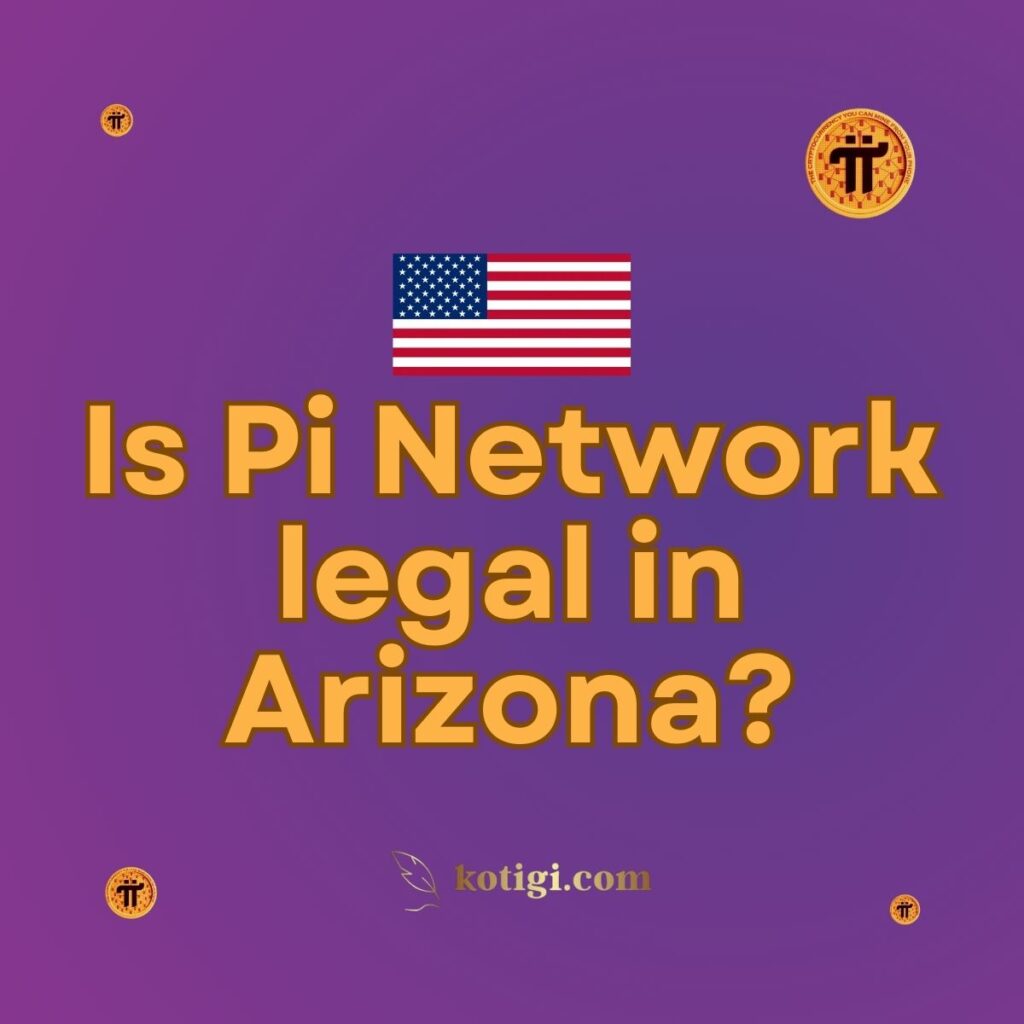
Is Pi Network legal in Arizona?
Pi Network is legal in Arizona, as there are currently no state-specific regulations restricting the use of cryptocurrencies like Pi. However, users must adhere to federal cryptocurrency laws, including Anti-Money Laundering (AML) and Know Your Customer (KYC) requirements, as well as taxation regulations. Arizona has historically supported blockchain and cryptocurrency innovations, making it a favorable environment for Pi Network’s growth.
Introduction
Cryptocurrencies are becoming increasingly mainstream, and Pi Network is one of the new players aiming to make digital currencies accessible to the average person. The legality of Pi Network varies from place to place due to differing state and national regulations. In Arizona, the legal status of Pi Network is shaped by the state’s broader approach to cryptocurrency, which has historically been progressive and welcoming to innovation in blockchain technology. However, users must still navigate both state and federal regulations to ensure compliance.
This article will explore the legal framework surrounding Pi Network in Arizona. We will delve into the state’s stance on cryptocurrency, the role of federal regulations, and any potential legal risks for Pi users in the state. Additionally, we’ll analyze how Arizona’s laws impact the future growth of Pi Network and what users should be aware of when using Pi in the state.
1. Arizona’s Legal Landscape for Cryptocurrencies
Arizona has been relatively open to blockchain technology and cryptocurrencies, making it a favorable state for Pi Network users.
1.1 A Pro-Cryptocurrency Stance
Arizona has historically been at the forefront of encouraging cryptocurrency and blockchain development. The state passed legislation as early as 2017 allowing residents to pay their state taxes with cryptocurrencies. Although this law didn’t take full effect, it showed the state’s proactive attitude towards the digital currency revolution.
1.2 Blockchain Technology Legal Framework
Arizona has also enacted a legal framework that explicitly recognizes blockchain signatures and smart contracts as legally binding. This law acknowledges the legitimacy of digital transactions, which supports the use of Pi Network in various business and legal contexts within the state.
1.3 Regulatory Clarity for Users
Unlike some other states, Arizona has not introduced stringent state-specific cryptocurrency regulations that would hinder Pi Network’s operation. As long as users comply with federal laws, they can legally mine and transact with Pi in Arizona.
2. Federal Regulations Impacting Pi Network in Arizona
While Arizona has been progressive in its stance on blockchain technology, federal regulations play a significant role in shaping the legality and use of Pi Network in the state.
2.1 Anti-Money Laundering (AML) Compliance
Pi Network users in Arizona, like those in other states, are subject to federal Anti-Money Laundering (AML) laws. These regulations require cryptocurrency networks to ensure that their platforms are not used to launder money or finance illegal activities. Pi Network has implemented AML protocols through its Know Your Customer (KYC) process, which verifies users’ identities.
2.2 Know Your Customer (KYC) Requirements
The federal government’s KYC requirements mandate that cryptocurrency platforms like Pi Network verify the identity of their users. This measure is designed to prevent criminal activity and ensure that all transactions are traceable. In Arizona, Pi users must complete this KYC process to fully access the platform’s features and comply with federal regulations.
2.3 Taxation of Cryptocurrencies
The Internal Revenue Service (IRS) considers cryptocurrencies like Pi to be taxable assets. Pi Network users in Arizona must report their earnings and transactions involving Pi on their federal tax returns. Failing to do so could result in penalties or legal action. Users should consult a tax professional to ensure that they are reporting their Pi transactions correctly under both state and federal tax laws.
3. Legal Risks for Pi Network Users in Arizona
Although Pi Network is legal in Arizona, there are still potential legal risks that users should be aware of.
3.1 Uncertain Regulatory Future
While Arizona has been a cryptocurrency-friendly state, the regulatory environment for digital currencies is constantly evolving. There is always a possibility that new state or federal laws could impose stricter regulations on Pi Network users in the future. Users must stay informed about any changes in cryptocurrency law to avoid legal issues.
3.2 Legal Consequences of Non-Compliance
Failing to comply with federal laws such as AML, KYC, and tax regulations could lead to significant legal consequences. For example, users who do not complete their KYC verification could have their accounts restricted or face fines. Similarly, failing to report Pi earnings on tax returns could result in penalties from the IRS.
3.3 Security and Fraud Concerns
Like all cryptocurrencies, Pi Network operates in a decentralized environment, which can be vulnerable to fraud and hacking. Users in Arizona should take steps to secure their Pi accounts and be cautious of scams. Legal recourse for cryptocurrency fraud can be limited, especially in a decentralized system like Pi’s.
4. Arizona’s Blockchain-Friendly Policies
Arizona is widely regarded as a blockchain-friendly state due to its progressive policies and legislative initiatives.
4.1 Blockchain Bill of Rights
Arizona passed a “Blockchain Bill of Rights,” which protects users of blockchain technology from being forced to share private keys and gives individuals the right to participate in decentralized networks. This legal framework supports the core principles of Pi Network’s decentralized model, making Arizona an attractive state for Pi users.
4.2 The Arizona Fintech Sandbox
Arizona has established a “Fintech Sandbox,” a program that allows financial technology companies, including those working with cryptocurrencies, to test their innovations in a relaxed regulatory environment. This sandbox encourages the development of blockchain technology and cryptocurrency applications, making it easier for Pi Network to operate and expand in the state.
4.3 Digital Notarization Using Blockchain
Arizona allows for digital notarization using blockchain technology, further cementing the state’s acceptance of digital assets. This could open up potential use cases for Pi in sectors like real estate and legal contracts within the state.
5. Opportunities for Pi Network in Arizona
Given Arizona’s favorable legal environment, there are many opportunities for Pi Network to grow and thrive in the state.
5.1 Expanding Pi’s Utility
With the legal recognition of blockchain signatures and digital contracts, Pi Network could see increased use in sectors such as legal services, real estate, and business agreements. The technology could make transactions more efficient and cost-effective for Arizona residents.
5.2 Collaboration with Fintech Startups
Arizona’s Fintech Sandbox could provide Pi Network with opportunities to collaborate with local startups and expand its ecosystem. This environment fosters innovation and could lead to new partnerships that enhance Pi’s utility.
5.3 Adoption by Local Businesses
As more businesses in Arizona become aware of cryptocurrency, Pi could be adopted as a payment method in various sectors, such as retail, hospitality, and entertainment. The state’s open stance on blockchain could facilitate faster adoption of Pi for everyday transactions.
6. Potential Legal Challenges
Despite the many opportunities, Pi Network could face some legal challenges in Arizona.
6.1 Regulatory Overhaul
While Arizona is currently blockchain-friendly, any future overhaul of federal cryptocurrency regulations could affect how Pi Network operates in the state. New rules from the Securities and Exchange Commission (SEC) or other federal bodies could impose stricter requirements on Pi users and potentially restrict certain activities.
6.2 Misuse of the Platform
Pi Network, like other cryptocurrencies, must guard against being used for illegal purposes. Misuse of the platform in Arizona for money laundering, fraud, or other criminal activities could lead to legal actions against the network and its users. The decentralized nature of Pi Network adds complexity to law enforcement’s ability to trace transactions and prosecute offenders.
6.3 Evolving Tax Regulations
The tax treatment of cryptocurrencies is still evolving, and Arizona’s residents must be mindful of how future tax laws could affect their use of Pi. As the IRS continues to refine its policies regarding digital assets, Pi Network users in Arizona may face new tax liabilities or reporting requirements.
Conclusion
Pi Network is legal in Arizona, benefiting from the state’s favorable stance on blockchain technology and cryptocurrency. While there are no specific state laws that restrict the use of Pi, users must comply with federal regulations, including AML, KYC, and tax reporting requirements. Arizona’s progressive legal framework and blockchain-friendly policies provide numerous opportunities for Pi Network to expand its presence and utility in the state. However, users should remain aware of potential legal risks and stay informed about any changes in state and federal regulations that could affect their use of Pi.
Key Takeaways
- Pi Network is legal in Arizona with no state-specific regulations restricting its use.
- Federal laws, including AML, KYC, and tax reporting, apply to Pi Network users in the state.
- Arizona’s blockchain-friendly policies, such as recognizing blockchain signatures and smart contracts, benefit Pi Network.
- Opportunities for Pi in Arizona include adoption by local businesses and collaboration with fintech startups.
- Potential legal challenges include evolving tax laws and the risk of federal regulatory changes.





